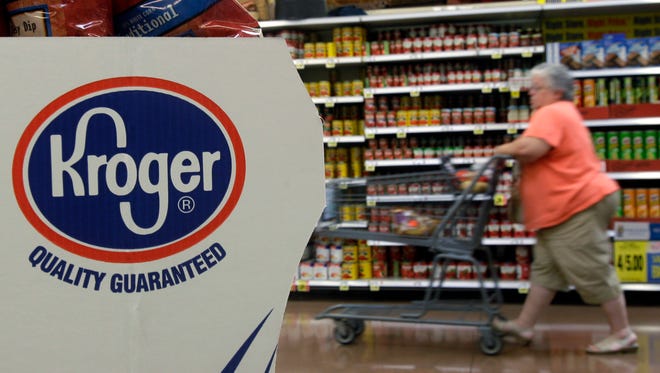Supermarket earnings tumble as food prices fall
Food prices are down at supermarkets across the country, which is good news for shoppers, but is denting profits and sales for retailers.

One of the nation's largest grocery chains, Cincinnati-based Kroger, blamed lower prices for denting its second quarter profits, as well as forcing it to lower financial projections for the rest of the year.
Food bought from grocery stores in July plunged 1.6% from the same month in 2015, the sharpest decline since January, 2010, according to the U.S. Department of Agriculture's latest food price outlook. The price declines are being led by drops in the cost of beef, veal, poultry and eggs. A strong U.S. dollar, which lowers the cost of imported food items, and lower oil costs are also contributing to dropping prices.
On Friday, Kroger reported a $383 million profit for the quarter, an 11.5% drop from the same period a year ago. Total sales climbed 4% to $26.6 billion for the period ended Aug. 13. Identical-store sales excluding fuel rose 1.7%.
The company lowered its earnings guidance for the year from a range of $2.19 to $2.28 to a range of $2.03 to $2.13. The company also cut back its capital investment plan from a range of $4.1 billion to $4.4 billion to a range of $3.6 billion to $3.9 billion.
Kroger's 47 cents adjusted earnings per share topped Wall Street estimates of 45 cents, but sales came in under $26.7 billion projection, according to Bloomberg. The company's net income per diluted share was 40 cents.
Stock up: Grocery prices have fallen for eight straight months
Last year, the company reported a $483 million profit on sales of $25.5 billion.
"The transition from inflation to deflation creates a difficult operating environment," Kroger CEO Rodney McMullen told analysts on a conference call, adding grocery items saw a 1.5 percent drop. "We’ve been through environments like this before. In 2009 we transitioned from inflation to deflation in a very similar way... Even though the current environment is volatile, we are confident that we will navigate today’s challenges and continue to deliver value for our customers and shareholders."
Falling prices can reduce a grocer's sales – and profits – even if consumer demand remains solid.
Lower food prices at the supermarket don't translate to restaurants. In fact, the USDA said the cost of eating out rose 2.8% in July from a year ago.